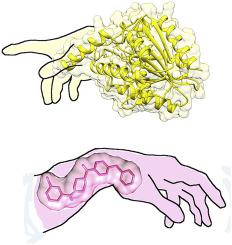European Journal of Medicinal Chemistry ( IF 6.0 ) Pub Date : 2020-10-07 , DOI: 10.1016/j.ejmech.2020.112857 Carlotta Granchi , Giulia Bononi , Rebecca Ferrisi , Eleonora Gori , Giulia Mantini , Sandra Glasmacher , Giulio Poli , Stefano Palazzolo , Isabella Caligiuri , Flavio Rizzolio , Vincenzo Canzonieri , Tiziana Perin , Jürg Gertsch , Andrea Sodi , Elisa Giovannetti , Marco Macchia , Filippo Minutolo , Tiziano Tuccinardi , Andrea Chicca

|
An interesting enzyme of the endocannabinoid system is monoacylglycerol lipase (MAGL). This enzyme, which metabolizes the endocannabinoid 2-arachidonoylglycerol (2-AG), has attracted great interest due to its involvement in several physiological and pathological processes, such as cancer progression. Experimental evidences highlighted some drawbacks associated with the use of irreversible MAGL inhibitors in vivo, therefore the research field concerning reversible inhibitors is rapidly growing. In the present manuscript, the class of benzoylpiperidine-based MAGL inhibitors was further expanded and optimized. Enzymatic assays identified some compounds in the low nanomolar range and steered molecular dynamics simulations predicted the dissociation itinerary of one of the best compounds from the enzyme, confirming the observed structure-activity relationship. Biological evaluation, including assays in intact U937 cells and competitive activity-based protein profiling experiments in mouse brain membranes, confirmed the selectivity of the selected compounds for MAGL versus other components of the endocannabinoid system. An antiproliferative ability in a panel of cancer cell lines highlighted their potential as potential anticancer agents. Future studies on the potential use of these compounds in the clinical setting are also supported by the inhibition of cell growth observed both in cancer organoids derived from high grade serous ovarian cancer patients and in pancreatic ductal adenocarcinoma primary cells, which showed genetic and histological features very similar to the primary tumors.
中文翻译:

可逆单酰基甘油脂肪酶(MAGL)抑制剂的第二代苯甲酰基哌啶衍生物的设计,合成和生物学评估
内源性大麻素系统的一种有趣酶是单酰基甘油脂肪酶(MAGL)。该酶可代谢内源性大麻素2-花生四烯酰基甘油(2-AG),由于它参与了一些生理和病理过程,例如癌症进展,因此引起了极大的兴趣。实验证据突显了与体内不可逆MAGL抑制剂的使用相关的一些缺点因此,关于可逆抑制剂的研究领域正在迅速发展。在本手稿中,基于苯甲酰基哌啶的MAGL抑制剂的种类进一步扩大和优化。酶促测定法鉴定出了一些在低纳摩尔范围内的化合物,分子动力学模拟预测了最好的化合物之一与酶的解离路线,从而证实了所观察到的构效关系。生物学评估,包括在完整的U937细胞中进行测定以及在小鼠脑膜中进行基于竞争活性的蛋白质谱分析实验,证实了所选化合物对MAGL与内源性大麻素系统其他成分的选择性。在一组癌细胞系中的抗增殖能力凸显了它们作为潜在抗癌药的潜力。





















































 京公网安备 11010802027423号
京公网安备 11010802027423号